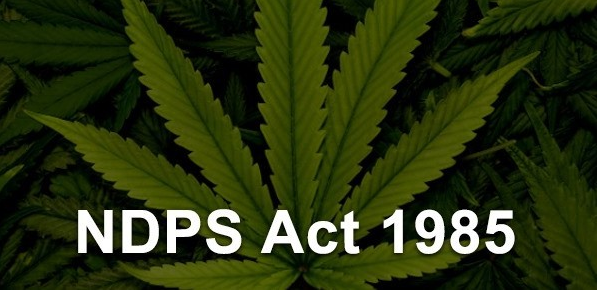Article 47 of the Constitution of India obligates the State to regard raising the standard of living and improvement in the public health as amoung its primary duties and in particular shall make endeavor to bring about prohibition of consumption of intoxication drugs which are injurious to health. Moreover, India is a signatory to three major drug control treaties i.e. United Nations Single convection on the Narcotic drugs, 1961, United Nations Single convention on psychotropic substances, 1971 & United Nations Convention against illicit traffic in Narcotic drugs and Psychotropic substances, 1988 which calls upon the member States to take concrete measures against illicit drug trade.
To fulfill its Constitutional and treaty obligations the government of India enacted Narcotic drugs and Psychotropic substances Act in the year 1985, popularly known as NDPS Act, through its central legislature which received the assent of the president of India & came into force in the month of November, 1985.
The NDPS Act has been divided into 6 chapters and consists of 83 sections. The act is intended to make stringent provisions for the control and regulation of operations relating to narcotic drugs and psychotropic substances and to provide for the forfeiture of the property derived from or used in illicit traffic of the narcotics.
The operation of the Act extends to whole of India and it also extends to Indian citizens who are outside India. Besides ensuring stringent punishment to drug peddlers the act is designed to prevent the illicit traffic in narcotics and rehabilitate the drug addicts. As the drug trafficking is often committed in a syndicate manner the network of which spreads over to many states the Central government under section 4 of the Act has been empowered to take measures to foster coordination amoung various officers, State Governments and other authorities.
Under the section Central Government is also invested with the power of formulating mechanism for the identification, treatment, after care and social reintegration of drug addicts. For control of drug abuse, a National fund has been constituted under section 7A of the Act by the Central Government. The fund shall be applied to meet the expenditure incurred in identifying, treating and rehabilitating addicts and educating public against drug abuse.
The penal provisions have been incorporated under Chapter III & IV of the Act. Section 8 of the Act prohibits the cultivation of Cannabis, coca plant & opium poppy and also prohibits the production, manufacturing, possession, sale, purchase, use, consumption, import/ export into or from India of any narcotic drug or Psychotropic substance.
Section 15 of the Act penalizes the persons who engage themselves in illicit traffic of Poppy straw. Such person, where the contravention involves small quantity, exposes themselves to punishment of imprisonment which may extend to one year and where the contravention involves intermediate quantity the term of imprisonment may extent to 10 years and fine up to 1 lakh and where the contravention involves commercial quantity (here exceeding 50 KGs) the offender will be liable to imprisonment which shall not be less than 10 years and may extend to 20 years and shall be liable to pay fine of up to Rs 2 lakh.
Similarly 20 of the Act penalizes the persons who involve themselves in the illicit traffic of Cannabis and renders them liable to the punishment of imprisonment of term which may extent to one year, 10 years or 20 years with fine where the contravention relates to small, intermediate & commercial quantity respectively. Similarly illicit traffic of psychotropic substance attracts penalty under section 22 of the NDPS Act.
The consumption of the narcotics or Psychotropic substances has been made a punishable offence under section 27 of the Act and whosoever is found involved in such consumption will be punishable with imprisonment for a term extending to one year. However, it will be pertinent to mention here that if the addict voluntarily seeks to undergo deadiction treatment he will be given immunity from the prosecution.
Rendering the premises to be used for the illicit traffic of Narcotics and Psychotropic substances renders the owner of premises liable to punishment of imprisonment. Financing directly or indirectly an illicit Narco trade is equally a punishable offence under the Act. The stringent nature of the Act can be gauged also from the fact that mere preparation to commit an offence under the Act is punishable.
The property obtained by the commission of illicit traffic in Narcotics is liable for forfeiture and powers have been vested in the officer in charge of the police station for tracing and identifying such property and where any property has been identified to have been obtained as a proceeds of illicit Narco trade the burden of proving that such property is not illegally acquired property shall be on the person affected.
To ensure justice is done not only certainly but also swiftly, offences punishable under NDPS Act have been made triable by a special court which shall be presided over by a Sessions Judge. The conventional bail jurisprudence is not applicable to cases which attract penalty under NDPS Act. An accused under the Act will not be admitted to bail unless the trial court is of the opinion that such accused is not involved in the commission of an offence. Furthermore, opportunity of being heard is to be given to the Public Prosecutor before ordering the release of the accused on bail.
Prevention of Illicit Traffic in Narcotic Drugs and Psychotropic Substances Act, 1988 familiarly known as PIT- NDPS is another legislation which governs the subject of illicit drug trade. The Act allows the preventive detention of the individuals engaging in illicit traffic of Narcotics up to the period of 2 years.
(Author is working as Senior Prosecuting Officer in Jammu & Kashmir Prosecution services. Feedback: [email protected])








